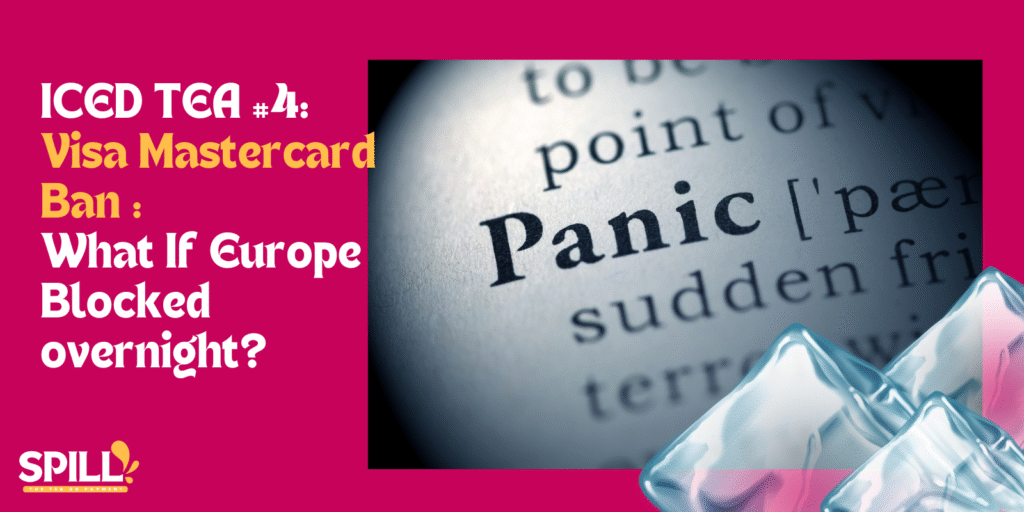To conclude this summer series, I decided to discuss the most unlikely scenario, but still an interesting one to explore, the sudden Visa/Mastercard ban. So ubiquitous, their names are equal to Payments, will it be possible to think in the context of the current geopolitical situation with the US, to imagine a scenario where they could disappear from Europe from one day to another?
Of course, this is a fictitious exercise to show you how sometimes payments can be geopolitical.
🚨Breaking news.
Following the imposition of tariffs on European goods by the American administration and the unilateral removal of sanctions on Russia, the European Commission, citing urgent systemic risk and with partial support from the Council of the European Union, has announced a bold countermeasure: a temporary regulatory exclusion of Visa and Mastercard operations within the European Union.
The temporary exclusion (set to begin next month) targets all intra-EU card transactions involving Visa and Mastercard. European consumers will still be able to use their cards outside the Union. However, the domestic usage will be blocked.
The European Commission justified the decision not only as a political response, but also as a reaction to a recent court ruling confirming both companies had engaged in anticompetitive practices, including coordinated retro-commissions and platform blocking tactics.
The measure also follows a major coordinated cyberattack targeting multiple issuers and processors linked to the Visa and Mastercard networks, attributed to hostile state-backed actors from Russia and North Korea. European regulators cited the urgent need to secure domestic payment flows and protect systemic resilience.
The Systemic Impact of a Visa Mastercard Ban in Europe
Visa and Mastercard have long faced scrutiny for their market dominance. A recent leak by a consortium of journalists suggests the existence of opaque scheme fee structures, possibly designed to circumvent the EU’s 2015 interchange fee cap by funnelling retro-commissions back to issuers. The investigation is ongoing.
Meanwhile, the Trump administration accused the EU of taking consumers hostage, calling the Visa Mastercard ban a “political stunt” and warning of economic consequences. European leaders, however, argue the opposite: EU countries must protect sovereignty in payments, especially when key infrastructure relies on non-European, publicly listed firms with limited accountability to EU citizens.
Yet, not all EU member states are on board: Ireland, Luxembourg, and several Eastern European countries have expressed strong reservations about the proportionality and potential economic backlash of the decision.
These states fear it could alienate American investors, complicate trade negotiations, and further fragment Europe’s internal market. Some have even warned that the move risks undermining the EU’s credibility as a stable jurisdiction for digital finance.
What Happens Now?
Operational chaos is the first consequence.
Visa and Mastercard underpin the majority of European card transactions, across POS terminals, e-commerce gateways, ATM networks, and mobile wallets. Even where local schemes exist, they are often co-badged or dependent on these networks for cross-border acceptance.
To avoid total disruption, the Visa/Mastercard ban will roll out in three phases:
- Phase 1 (Immediate): Freeze on new acquiring licenses and issuer contracts involving Visa/Mastercard.
- Phase 2 (30 Days): Suspension of all intra-EU transactions on Visa/Mastercard cards.
- Phase 3 (60 Days): Gradual deactivation of scheme acceptance in EU merchant networks, excluding essential travel categories.
Emergency meetings have already been held between the European Central Bank, major national central banks, and industry leaders. The goal: maintain the flow of commerce and protect consumers.
The Patchwork Response
With Visa and Mastercard sidelined, alternative rails must step in:
- National schemes like France’s Cartes Bancaires and Germany’s Girocard will expand interoperability.
- EPI (European Payments Initiative) and EuroPA have announced they will accelerate deployment of their retail acceptance pilots, though sources admit neither are ready for large-scale rollout.
- Fintech players are rushing to fill the gap. Several EU-based firms announced emergency wallets, QR-based payment solutions, and even temporary travel accounts to accommodate summer tourists.
- The ECB is coordinating a task force to define a European QR code standard for point-of-sale payments.
Tourists, meanwhile, face uncertainty. American cardholders (and many others) may need to rely on cash or partner-issued digital wallets. Chinese and Japanese schemes (UnionPay, JCB) confirmed there will be no impact on their customers, highlighting Europe’s strange openness to external players even while clamping down on US incumbents.
A Legal Storm Ahead
While the political symbolism of the Visa Mastercard ban is strong, its legal foundations are shaky.
Visa and Mastercard will eventually challenge the regulatory exclusion in EU courts, especially given its grounding in a fast-tracked emergency ruling on anticompetitive behaviour and systemic vulnerability. They are likely to argue that the measure violates principles of proportionality, due process, and non-discrimination under EU law.
Legal observers expect both firms to request an emergency injunction to delay the rollout while their legal teams review arguments. Meanwhile, the United States may escalate the dispute to the World Trade Organization (WTO), framing the EU’s action as a politically motivated, discriminatory restriction against American businesses.
Lawsuits could also emerge in national courts across the Union, especially if a bank partnership or local subsidiary is affected. Member states that opposed the decision might use national channels to seek exemptions or stall implementation, adding layers of complexity to an already fragile consensus.
What began as a response to cyberattacks and regulatory breaches could quickly evolve into a protracted legal standoff, testing not only judicial systems, but the cohesion of EU digital sovereignty efforts.
Panic in the Markets
News of the regulatory exclusion sent immediate shockwaves through global markets. Both Visa (V) and Mastercard (MA) stocks opened with double-digit losses on the NYSE, triggering temporary trading halts under the exchange’s volatility protection rules.
Investors rushed to price in the risk of long-term disruption to core revenue streams, especially from European cross-border acquiring. Analysts estimate the EU represents nearly 20–25% of total processing volume for both networks.
Financial institutions across the EU, especially those heavily reliant on card issuing revenues, also saw sharp declines, with several banking stocks falling 5–8% in early trading.
Market observers noted that uncertainty, not just policy, was driving the panic: if Visa and Mastercard could be frozen out of Europe, what other regions might follow?
A Strange Kind of Clarity
For years, European policymakers have warned about overdependence on non-EU payment infrastructure. The irony is: it took a geopolitical rupture to test the resilience of the system.
The rules that once promised stability and predictability have become the very reason Europe struggles to move fast. PSD1 and PSD2 created a common market, but also locked the continent into platforms it didn’t own.
Would this kind of ban ever happen? Probably not. Could it spark something new if it did? Definitely.
Final Thoughts
Of course, it is a thought-provoking forecast.
We often treat global payment networks as untouchable. But they remain private companies, operating in a political world. As digital payments become infrastructure, the line between policy and protocol blurs.
A Europe that bans Visa and Mastercard overnight is chaotic, yes, but it’s also potentially a time to reinvent and be imaginative. New schemes must prove they can scale, local champions stop waiting for political cover.
The goal of this piece isn’t to argue for disruption; it’s to prepare the mind for it. Because in payments, as in politics, nothing stays stable forever.
🧃 This was the last episode of Iced Tea – Fictional Chill for a Hot Summer. I hope you enjoyed this bold and thought-provoking serie, don’t hesitate to catch up on the previous episodes :
Episode One : What if Europe banned Interchange fee model
Episode Two : What if Europe had a real public infrastructure
Episode Three : What if PSD never existed?
This article is a fiction. All scenarios are imagined to explore systemic consequences of bold and unpredictable decisions. Any reproduction without this warning is not the responsibility of the author.







